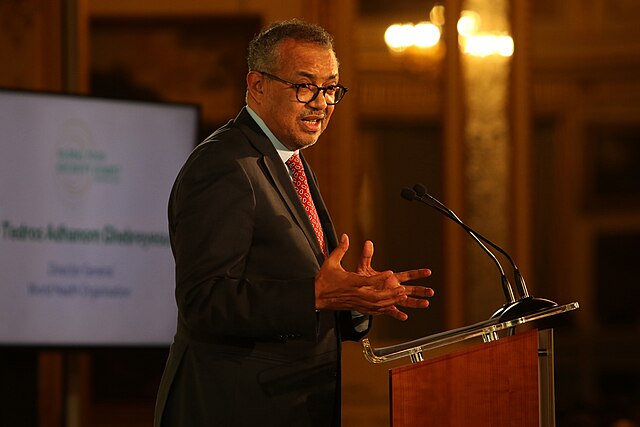Mission critical for humanity: WHO Chief urges action at WES
Students at the 23rd edition of the annual Warwick Economics Summit (WES2024) were presented with a stark reality and a powerful call to action by Dr. Tedros Adhanom Ghebreyesus, the eighth and current Director-General of the World Health Organization (WHO). In his address, titled “Mission Critical for Humanity,” and conversation with students, Dr. Tedros underscored the importance of learning from the COVID-19 crisis and preparing for the inevitable next pandemic.
Dr. Tedros began by painting a sobering picture of the current global situation, highlighting the climate crisis and the ongoing COVID-19 pandemic. He emphasised how the pandemic exposed stark inequalities in healthcare access and preparedness, leaving the poorest countries behind despite the record-breaking development of vaccines.
Offering a comprehensive look at the past three years, the painful lessons learned from the pandemic past were recounted and there was a call for concrete measures to improve global health security. He stressed the need for strengthened research capacities, international cooperation, and robust legal frameworks to ensure countries work together effectively in future health emergencies.
The Director-General identified two major obstacles: a lack of consensus among some countries and the rampant spread of misinformation. He emphasised that the WHO is not seeking to impose mandates, but rather to facilitate dialogue and build common ground through evidence-based support. He addressed concerns about the proposed international agreement on pandemic preparedness, clarifying that it does not grant the WHO any additional power and allows for sovereign states to withdraw at any time.
Recognising the large impact of pandemics on young people’s education and future prospects, Dr. Tedros implored them to raise their voices in support of the international agreement. He highlighted the importance of sharing personal stories to counter misinformation and raise awareness about the agreement’s significance for their future. Finally, an appeal to a call of action was then made to the audience of young students present at the event.
In a conversation format panel, students from around the world present at WES2024 also shared their personal experiences with the Director-General and the audience, enriching the talk in their diversity of difficulties. Elizabeth, a student from the University of Exeter, spoke of the fear and disruption caused by online learning and limited access to healthcare in her country; Catherine, a student at the University of Southampton, highlighted the secondary impact on education, particularly for young people often overlooked; Sergi and Sofia, both students at Pompeu Fabra University, Barcelona, described the sudden shutdown of schools and the challenges of remote learning that exacerbated existing inequalities.
Following the presentations, the audience had the opportunity to ask questions. One student inquired about combating misinformation regarding the WHO’s proposed Pandemic Accord, particularly on social media. Dr. Tedros Adhanom encouraged proactive engagement on platforms like TikTok, using the accord’s key tenets like equity and access to create impactful content.
When asked about concrete actions young people could take Dr. Tedros advised them to understand the accord and Familiarise themselves with its contents and implications. Following the address, the global youth was also encouraged to share their voices and experiences with the COVID-19 pandemic on their social platforms using the hashtags #AreWeReady and #PandemicAccord to promote the global campaign that started at WES2024. This campaign is aimed at raising awareness of the need for a global pandemic treaty as well as informing the youth about its importance.
The address by the WHO’s Director-General and conversation with students both served as powerful reminders of the global challenges posed by pandemics and the urgent need for international cooperation and preparedness. By empowering young people with knowledge, tools, and a call to action, he provided a glimmer of hope for a more resilient and equitable future in the face of emerging health threats.

Comments